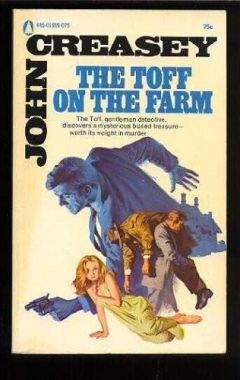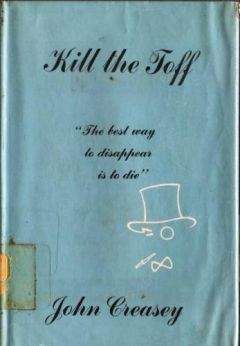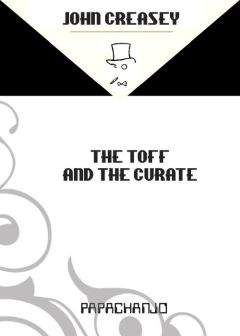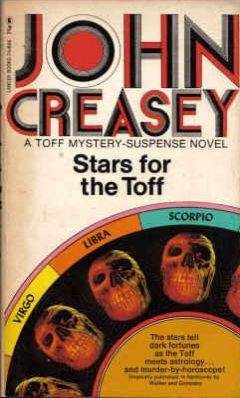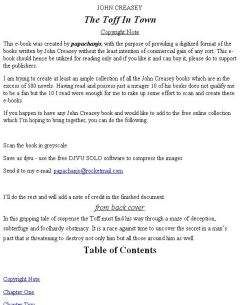John Creasey - The Toff and the Fallen Angels
На сайте mybooks.club вы можете бесплатно читать книги онлайн без регистрации, включая John Creasey - The Toff and the Fallen Angels. Жанр: Прочее издательство неизвестно,. Доступна полная версия книги с кратким содержанием для предварительного ознакомления, аннотацией (предисловием), рецензиями от других читателей и их экспертным мнением.
Кроме того, на сайте mybooks.club вы найдете множество новинок, которые стоит прочитать.
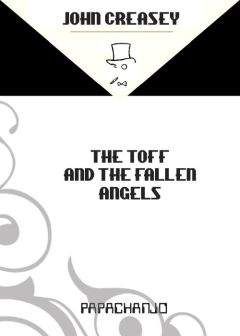
John Creasey - The Toff and the Fallen Angels краткое содержание
The Toff and the Fallen Angels читать онлайн бесплатно
CHAPTER 14
Motive?
“YES,” answered Rollison, “I will come to the meeting if you’ll give me safe conduct from angry mothers! What are you going to use to mend that wire?”
“I expect we’ll use wire,” answered Anne. “I know we promiscuous young women are not supposed to know about anything but luring young men to our beds, but we’re very capable, really. Jennifer will—why, there is Jennifer!” A little girl who looked in her mid-teens appeared from the back door with a grey metal tool box in her hand, and a coil of wire over her shoulder. She had mousey hair and a snub nose and freckles beyond count, and was dressed in blue jeans and a loose fitting red shirt. She flashed brilliant green eyes at Rollison and Anne. “Come and meet Mr. Rollison,” called Anne, and the child came across and dropped a mock curtsey.
“Good afternoon, Mr. Rollison, I’ve heard about you. Fancy actually admitting we exist!”
“And fancy you existing,” retorted Rollison. “So you’re the do-it-yourself member of the establishment?”
“When I wear trousers I’m the maintenance engineer,” said Jennifer. “Do you know who made that hole?”
“No.”
“Well, as the great detective, why don’t you find out what was happening next door?” suggested Jennifer. “Anyone can sneak in from there and if your arms are long enough you could actually stand in Sir D’s garden and cut the wire. Or is he too rich to be suspected?”
“Jennifer, pet, the chips on your shoulders would make a log fire big enough to roast the poor devil,” protested Rollison. “Haven’t any of you heard of a little thing like evidence?”
She made a face at him, and walked past. The noise had subsided, and although there was much talk and now and again a subdued outburst of laughter, there was not a single crying baby.
“What time is your meeting?” asked Rollison.
“It’ll be about half-past eight. You don’t have to come,” Anne said. She turned her brown, speculative, almost brooding eyes towards him, and added: “You don’t always have to take me too seriously, either.”
“No,” agreed Rollison, “but the choice is a little tricky. I can’t always decide when you’re telling the truth and when you’re set on deceiving me.”
Once again he succeeded in shaking Anne Miller out of her calm. He smiled and turned. There was no sign of Naomi Smith, and had she been at home she would certainly have been here. He went through the house, heard a baby gurgling in a room on the right, but did not go in. A police car was in the street, and three plainclothes men were heading for the back of the house. Rollison recognised none of them, and did not stop. He turned again into Starter’s house, and rang the front door bell, as he had before.
Guy Slatter opened the door.
“Hallo,” he said, standing aside. “Come in.” His manner showed a complete change from the aggressiveness of their last encounter. “This time, I think, my uncle would like to see you.” He led the way upstairs, and as they reached the door of the study, Angela appeared at the end of the passage. Rollison glanced at young Slatter. He was surprised to catch on his face an expression of almost fatuous admiration.
Angela, looking very demure, gave a half-smile as she passed.
“Good afternoon, sir.”
Guy murmured something, as he opened Slater’s door. The most noticeable thing here, Rollison thought, was the quiet, although the window had been re-opened. Slater placed a hand on some papers, to stop them from blowing, and rose from the desk.
“I’m glad you came back,” he said. “Please sit down. All right, Guy.”
Guy moved off with alacrity, letting the door close with a loud click. The old man looked across at it with resignation, but made no comment.
“Why did you come back?” he asked.
To find out whether, after the rat interlude, you would reconsider your decision,” Rollison said. “Obvi-ously someone is determined to drive those girls away—by frightening them or pressuring them by threats of, and even by actual, murder. If you changed your mind, no one would retain the slightest suspicion that you are responsible.”
“Mr. Rollison,” said Slatter, placing both hands palms downwards on his desk, and looking like a newly-shaven Old Testament prophet, “I shall not extend the tenancy of this house next door to those particular tenants. I am quite determined. I want peaceful occupancy of my own home and it is impossible in the present circumstamces. They must go. However, the rat interlude, as you call it, did distress me. So did the attack on Mrs. Smith. I am not of course involved in either, and am quite indifferent to any form of suspicion which may fall on me, and your quite unworthy attempt to blackmail me into giving way is not the reason for what I am about to offer. I have a great deal of property in London, some in areas more suitable than this for a hostel. I am prepared to give premises of similar size to the sponsors of Smith Hall, on two conditions. One : that they move immediately the alternative accommodation is available, which I think will be very shortly. The other, that the transaction is kept quite confidential. No one is to know. And if you wonder why I make the second condition, I will tell you : if it were once known that I had made a gift I would be inundated with requests from other sources for donations.”
Rollison thought swiftly. A property of size anywhere in London would cost at least twenty thousand pounds, and such a gift even from a wealthy man was munificent indeed.
As he sat there, trying to think how best he could tell this man how warmly he regarded the offer, there was a violent crash, and a half-brick hurtling through the window. Startled by the expression on Rollison’s face, which appeared a half-second before the impact, Slatter swivelled round in his chair.
“Duck!” roared Rollison.
But it was too late. Glass cascaded into the room, over Slatter’s face and hands, over the desk and the floor. Rollison sprang to his feet. A sliver of glass cut into his cheek, causing sharp pain, but it did not stop him. He reached the window and peered out through the huge star-shaped hole in the glass.
No one was in sight. And the only place for anyone to hide was in the house next door.
He saw a policeman, running and staring up: he pointed to Smith Hall, then turned to face Sir Douglas Slatter.
Slatter was sitting, as if stunned, blood streaming down his face, where glass had struck the flesh like daggers.
In a sharp, authoritative voice, Rollison said : “Sit still, Slater. Just sit absolutely still.”
He glanced quickly outside again and saw Naomi Smith, then he turned back to the injured man. With gentle speed he pulled out the glass splinters—those from near the eye first. The astonishing thing was Slatter’s statue-like stillness. His face was set, he did not move a muscle.
There were cries in the gardens outside, and a baby began to scream. There were also sounds inside this house, and as Rollison drew out the last splinter, the door opened and first Angela and then Naomi Smith appeared. Angela drew in her breath with a sharp hiss, Naomi’s cheeks blanched but she came across without hesitation, and called to Angela :
“Bring a wet towel—quickly. Then a bowl and more towels.”
Angela turned and ran, as Rollison took out a handkerchief and placed it gently over the largest of the cuts.
“Unless your eye is damaged, there’s nothing serious,” he said in a reassuring voice. He withdrew the handkerchief, now stained crimson, and went on: “Open your eye slowly—very slowly.”
Slater made no attempt to open his eye and did not move; it was almost impossible to detect the signs of breathing.
“Douglas,” Naomi said firmly and clearly, “try to open your eyes.”
Her words had not the slightest effect, and she gave Rollison a quick, frightened glance. Rollison now saw a faint movement at Slatter’s lips, and felt his pulse; it was beating very slowly. The eye was filling up with blood again and he dabbed the handkerchief on with great care.
“I think he’s in shock,” he said. “Do you know his doctor?”
“Yes—Dr. Morrison, who lives at Number 7.”
“Will you find out if he’s in?”
“But—”
“I’ll see to Sir Douglas,” Rollison promised.
She moved to the telephone as Angela came in with a towel, wrung out loosely. She unfolded it as she approached, then placed it with great care over Slatter’s face. She did not press hard, but moulded it over his features, even into his eyes. Rollison had a moment to glance outside; a policeman was looking up at the window, as if measuring the distance.
“Is Dr. Morrison in?” Naomi sounded remarkably collected. “Mrs. Smith, for Sir Douglas Slater.”
Another policeman appeared inside the cage next door.
“We’ll need more towels,” Rollison said to Angela. “Is Guy Slatter in?”
“He went out five minutes before the—the crash.”
“All right,” said Rollison. “Hurry with those towels.” Naomi put the telephone down, saying with relief : “We were lucky—he’s coming at once.”
The cuts were bleeding less freely now, and had obviously been superficial. The alarming thing was Slatter’s uncanny stillness.
“Naomi,” Rollison said, “do you know who threw the brick?”
“I—I’ve no idea.”
“It must have been someone next door.”
“I can’t believe any of the girls—” began Naomi, only to stop and close her eyes as if the very thought was painful. “They—they said such wild things, I hardly knew what to think.”
“After the visitation by rats?”
“Yes. Mr. Rollison, who is doing these terrible things?”
“We’re finding out,” answered Rollison grimly. “But your job is to find out whether one of the girls threw this brick— and if one did, who it was.”
“But you said you were sure it came from Smith Hall.”
“Someone else could have gone in,” Rollison pointed out. He glanced outside again and saw one of the policemen beckoning—and at the same moment, Angela appeared with fresh towels. He drew back, watching Slater, who still showed no sign of life but sat like a statue. “I’ll be back soon,” Rollison went on. “We simply must find out if it was one of the girls.”
He went out and down the stairs. As he left by the front door, an old Rolls Royce pulled up and a middle-aged man got out, carrying a black bag. They met halfway along the drive.
“Dr. Morrison?”
“Yes.”
“You’ll find the patient in his study.”
“Not alone, I trust!”
“No, not alone.”
“Are you—Mr. Rollison
“Yes,” said Rollison. He gave a brief, bleak smile, and then went—for once—out of this gateway into the next.
Standing in the window of Naomi Smith’s room were Anne Miller and Judy Lyons; Judy was talking loudly and flinging her arms about, but the moment she saw Rollison, she stopped. Anne stared at him, as if in defiance. He did not go into the house but walked alongside it, to the two policemen. Almost as Rollison stopped in front of them a car pulled up in the street, and, glancing over his shoulder, Rollison saw three plainclothes policemen get out.
“Did you see who threw the brick?” asked Rollison.
“Yes,” one of the policemen said, with complete certainty. He smiled drily as he went on : “You didn’t expect that, did you, Mr. Rollison?”
“I hoped for it,” Rollison said mildly, but in fact he was astonished—it seemed almost too easy in this complex series of crimes. “Who was it?”
“The tall, dark girl.”
“Anne Miller?”
“Anne, yes. I don’t know her other name. Was Sir Douglas hurt?”
“Not badly, I hope,” Rollison said. “A doctor’s with him now.” He turned away and walked back briskly, meeting the plainclothes men near the porch.
As he entered the house, he heard Judy cry: “It’s no use, you’ve got to run away! They saw you, I know they saw you.”
“You’re absolutely right,” Rollison said, pushing open the door of Naomi’s room. “They saw and can identify you, Anne—and if Sir Douglas should lose the sight of one eye, God knows what sentence the court would give you.”
“Oh, dear God!” gasped Judy.
Anne’s eyes were narrowed but she did not move. “You’re trying to frighten me,” she said.
“I’m telling you that you’re in real trouble,” Rollison said, “and the fact that you felt viciously angry because of the rats won’t be much help to you in court. Nor will you be able to pretend you didn’t know that Sir Douglas was there, he could be seen from every window on this side of the house.” He swung round on Judy. “Did Mrs. Smith give you a letter to post to me, two or three days ago?”
Judy shifted evasively, and mumbled, “Yes.”
“Why didn’t you post it?”
“But I did! I swear I did!”
“Judy, pet,” said Anne Miller, “didn’t you know that the great Richard Rollison can detect a lie before it actually passes your lips? Can’t you, Mr. Rollison? The truth—as you appear to be so fond of it—is this. Judy asked me to post the letter and I promised her I would, but I did not. I will tell you another truth. I wanted to see what Mrs. Smith said to you, and steamed open the letter. I didn’t like what it said, so I didn’t send it.”
“What didn’t you like?” asked Rollison.
“That I will not tell you,” Anne said.
“You can tell me instead, why you lied when you told Naomi Smith that Angela wanted to see her at Lyons Corner House,” said Rollison sharply.
“I suspected that Angela was a spy,” said Anne, simply. “And when Mrs. Smith just rushed out, I knew I was right.”
As she finished, footsteps sounded in the hall and a man called out in a deep and authoritative voice: “Is Miss Anne Miller in there, please?”
“Oh, Anne, Anne!” sobbed Judy. “You should have run away!”
CHAPTER 15
Help From Gwendoline
No one seemed less likely to run away than Anne Miller. She squeezed Judy’s arm, then went to the door and opened it to two of the C.I.D. men who had just arrived. She stood aside, saying:
“I am Miss Anne Miller.”
“Thank you, Miss Miller.” The spokesman of the two was short, thickset, very fair-haired—almost an albino, with stubby eyelashes and colourless eyebrows. “I am Detective Sergeant Adams of the Metropolitan Police.” His pale blue eyes flickered towards the Toff. “Did you throw a brick at the first floor window of the house next door?”
Before anyone could speak or the Toff advise, Anne said :
“I did, with relish.”
“Are you aware of the gravity of your statement, Miss Miller?”
“I know what it means,” Anne answered.
“I have to inform my superiors, Miss Miller. May I have your assurance that you will remain here to answer further questions?”
Похожие книги на "The Toff and the Fallen Angels", John Creasey
John Creasey читать все книги автора по порядку
John Creasey - все книги автора в одном месте читать по порядку полные версии на сайте онлайн библиотеки mybooks.club.
